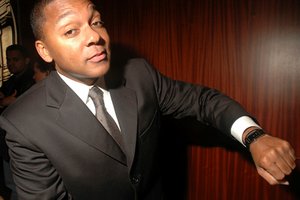“Intangible Asset 82” is an independent film which chronicles Australian jazz drummer Simon Barker’s trip to Korea in search of grand-master shaman drummer Kim Seok-Chul. The title of the movie refers to the fact that the South Korean government has declared Seok-Chul to be a national “intangible” asset. I bought the dvd after seeing a recital by Barker and some traditional Korean muscians at Lincoln Center’s “Target Free Thursdays.”
At the recital Barker tells the story of first heard the grandmaster on a rare recording. The person who played the recording for him said something like “this is an example of awful drumming.” Barker’s reaction was that this was the best thing he ever heard in his life and he wanted to find out all about it.
This is a great start. He likes what other people hate, this chaotic free-form improvisatory drumming. As a jazz drummer he must have had a degree of freedom to improvise, but nothing like what he heard on the recording. I find that jazz, in general, despite its reputation for creativity and freedom, can often seem bland and overly formalized. Think of how much jazz sounds the same, or of the traditionalist spoutings of this guy:
I would rather hear Koreans banging on pots and pans than Wynton Marsalis hectoring me on the classicism of Louis Armstrong.
Barker visited Korea seventeen times before this final trip, where he meets Seok-Chul just days before the shaman dies. Along the way we meet various other shamans and traditional musicians. We are told that the apprenticeship for being a shamanic singer is to live in a hut by a waterfall for several years, and to shout at the top of one’s lungs for literally seventeen hours a day. Have you ever tried to shout at the top of your lungs for 10 minutes?
I wished that Barker would have taken a more questioning approach to Korean music and culture. For example, he often describes Korean rhythms as “incredibly complex”. The point is made several times that improvisation is based on rigorous technique and years of study. I didn’t hear this. As an erstwhile drummer I didn’t hear time signatures being changed, or intersecting polyrhythms, I just heard pleasant banging. But I liked the banging, and I like the traditional singing, which was most often like a throaty wail. It seemed highly improvised and honest. I didn’t see the need to justify it.
Barker seemed blissed out for most of the film, like a Deadhead (another genre I don’t get) and the soft-focus cinematography reflected his mood. Lots of sunrises and sunsets, lights blinking on, picturesque old men in the public square, little children running. Like a K.A.L. commercial. My reaction to this was that I was being sold something. Perhaps he was trying to put a sweet coating on a challenging type of music that can sound harsh and simultaneously chaotic and repetitive. I longed for a happy traditional Korean tune.


I tend to agree with you at first hearing the raw representation at the beginning of the movie. I feel “raw” being a keyword, here. BUT… I’m not a professional drummer or skilled in the discipline, this rhythm spoke to me at a level I have had bottled up. I really can’t explain it. It caused a mild emotional catharsis. I’ve had this rhythm rolling around in me for years. It’s chaotic and jerky (if I can say) but indeed “raw”. Shamanism, I feel, touches the raw the primitive the ancient. So this drumming and sound, also. I have heard similar in the Lakota and Cherokee music and chants. Jazz… well, it’s there too at an organic (sorry to use an overused adjective) level.
ciao…
That’s great that it spoke to you. I do improv (comedy) and the improvisational aspect and honesty spoke to me too, I found it was a good antidote to overparsed precious jazz culture.
great review. I felt the same way.